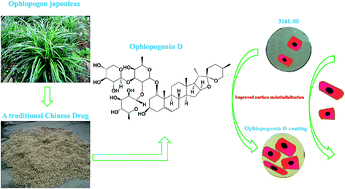Immobilization of Ophiopogonin D on stainless steel surfaces for improving surface endothelialization†
Abstract
Ophiopogonin D, a traditional Chinese medicinal ingredient, was immobilized to form a coating onto the surface of 316L stainless steel (316L SS), which is often used in cardiovascular implant materials, and evaluated for its endothelialization ability in vitro. The immobilized coating showed more hydrophilic property compared with the 316L SS control, contributing to protein absorption and cell spreading. A CCK-8 assay was performed to investigate the attachment and proliferation of vascular endothelial cells (VEC) onto the coating, and the results showed that there were more VEC on the Ophiopogonin D coating than on the 316L SS surface. The acridine orange (AO)/propidium iodide (PI) staining images of the VEC proved that the Ophiopogonin D coating could effectively inhibit VEC apoptosis, compared with the control. In addition, VEC on the Ophiopogonin D coating released more nitric oxide (NO) and PGI2 compared with VEC on the 316L SS. All the results indicated that Ophiopogonin D could significantly improve surface endothelialization and possessed potential applications for the surface modification of cardiovascular devices.


 Please wait while we load your content...
Please wait while we load your content...